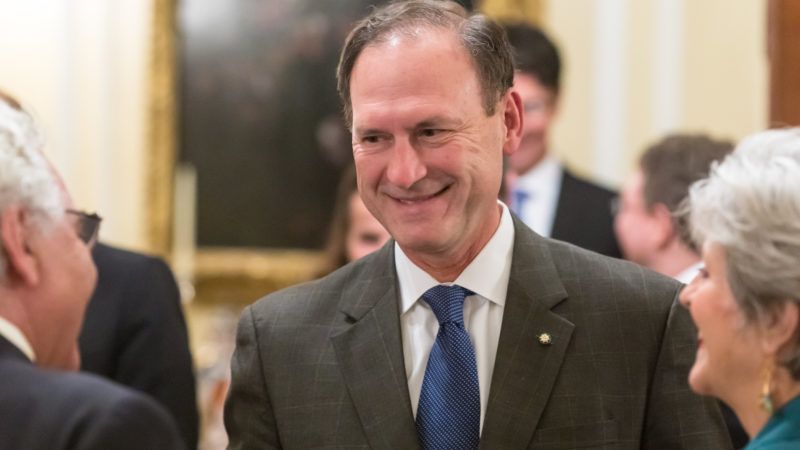Deeming a Lawsuit Moot, SCOTUS Passes Up a Chance to Correct Judicial Disrespect for the Second Amendment
The Court decided that New York City's revision of its restrictions on transporting guns gave the plaintiffs what they sought.

The U.S. Supreme Court today dismissed a challenge to New York City's uniquely onerous restrictions on transporting firearms, concluding that the lawsuit was rendered moot by changes the city made to its regulations after the justices agreed to hear the case. The Court remanded the case to the lower courts, which it said may consider whether the plaintiffs can add a new claim for damages.
New York State Pistol & Rifle Association v. New York is the first case involving firearms and the Second Amendment that the Court had agreed to hear since 2010. Gun rights supporters hoped it would provide an opportunity to correct excessive judicial deference to state and local lawmakers.
New York's rules, adopted in 2001, originally allowed residents to remove legally owned guns from their homes only while en route to or from one of seven gun ranges within the city. That meant they could not legally take their guns, even unloaded and stored in locked containers separated from the ammunition, outside the five boroughs to practice at ranges, participate in competitions, or defend themselves in second homes.
"After we granted certiorari," the Court notes in its per curiam opinion, "the State of New York amended its firearm licensing statute, and the City amended the rule so that petitioners may now transport firearms to a second home or shooting range outside of the city, which is the precise relief that petitioners requested in the prayer for relief in their complaint." It concludes that "petitioners' claim for declaratory and injunctive relief with respect to the City's old rule is therefore moot."
Justice Samuel Alito, joined by Justices Neil Gorsuch and Clarence Thomas, dissented. "By incorrectly dismissing this case as moot, the Court permits our docket to be manipulated in a way that should not be countenanced," Alito writes. He notes that New York City successfully defended its regulations in federal district court and the U.S. Courts of Appeals for the 2nd Circuit, only to throw in the towel after the Supreme Court took up the case.
"Although the City had previously insisted that its ordinance served important public safety purposes," Alito wryly observes, "our grant of review apparently led to an epiphany of sorts, and the City quickly changed its ordinance." He notes that "we have been particularly wary of attempts by parties to manufacture mootness in order to evade review."
Alito argues that the plaintiffs—the New York State Rifle & Pistol Association and three gun owners—did not obtain all of the relief they sought, which included "unrestricted access" to ranges and competitions outside the city. The new rules require that travel outside the city be "direct" and that travel within the city be "continuous and uninterrupted." During oral argument, the city's lawyer said that language did not preclude "bathroom breaks," "coffee stops," or other "reasonably necessary stops in the course of travel."
In Alito's view, that assurance did not go far enough: "What about a stop to buy groceries just before coming home? Or a stop to pick up a friend who also wants to practice at a range outside the City? Or a quick visit to a sick relative or friend who lives near a range? The City does not know the answer to such questions."
The original lawsuit sought an injunction, declaratory relief, attorney's fees, court costs, and "any such further relief as the court deems just and proper." Although the plaintiffs did not specifically ask for monetary damages, Alito says, they might nevertheless have received them if the Supreme Court had ruled that the regulations violated the constitutional right to keep and bear arms. "If there is a possibility of obtaining damages in any amount," he writes, "the case is not moot."
Had the Court addressed the constitutional question raised by the case, Alito says, the answer would be clear. "The City's travel restriction burdened the very right recognized" in the landmark 2008 Second Amendment case District of Columbia v. Heller, he notes. "History provides no support for a restriction of this type. The City's public safety arguments were weak on their face, were not substantiated in any way, and were accepted below with no serious probing. And once we granted review in this case, the City's public safety concerns evaporated."
Alito worries that New York's mootness maneuver has prevented the Supreme Court from correcting a lack of proper judicial respect for the Second Amendment. "We are told that the mode of review in this case is representative of the way Heller has been treated in the lower courts," he writes. "If that is true, there is cause for concern."
Justice Brett Kavanaugh, although he joined the majority in concluding that the case is now moot, agreed with the dissenters that lower courts may need to be reminded of the rights that the Court recognized in Heller and in McDonald v. Chicago, the 2010 decision that applied the Second Amendment to the states. "I share Justice Alito's concern that some federal and state courts may not be properly applying Heller and McDonald," Kavanaugh writes in a concurring opinion. "The Court should address that issue soon, perhaps in one of the several Second Amendment cases with petitions for certiorari now pending before the Court."


Show Comments (18)